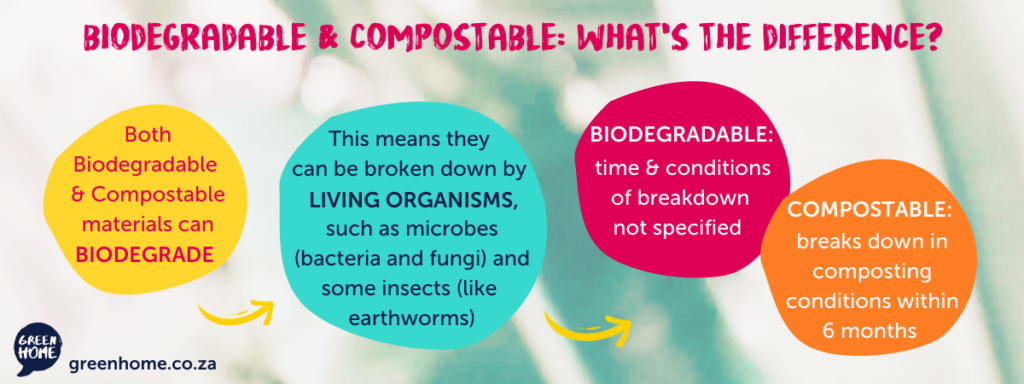Same, but different. We explain the distinction between biodegradable & compostable
The terms biodegradable and compostable both refer to materials that can biodegrade.
This means they can be broken down by biological – living – means. Those ‘biological means’ are usually microbes (AKA bacteria and fungi) and certain insects, for example earthworms. The microbes and insects essentially ‘eat’ the materials, and break them down to their basic component parts. Things like carbon, water, biomass and nutrients, which are also some of the building blocks of life. These can then be reused
Biodegradation is the genius method Nature has been using and evolving to re-cycle the components of life for as long as life has been around. Yup, all organic life is part of a giant recycling loop!
The importance of time & place
So, we know how biodegradable materials break down. But what about how long they take to break down? And, in what conditions?
We know that most things will break down given enough time. Unless they’re frozen inside a glacier. Or in another seriously stable sub-zero condition.
It obviously matters if something is able to biodegrade within weeks, months, years, or millenia. Things that cannot break down in a reasonable amount of time can cause a lot of harm while they persist. That’s exactly what happens with plastic, which, as we all know, doesn’t biodegrade.
This shows us that with biodegradation conditions matter as much as time.
For instance, we’ve all experienced that food left outside on a hot day will start to biodegrade much faster than food kept refrigerated.
And this is where the term compostable comes in. It gives us more information about how long a product takes to break down, and in what conditions.
Compostable products can break down in composting conditions within 6 months. This is the composting standard for compostable products.
In our experience, the majority of compostable products will break down faster than this in good composting conditions, usually within 4 to 12 weeks or so, and at times even faster than that.

Composting is essentially engineered biodegradation. By mixing materials together, usually in large heaps, composting creates optimal – Goldilocks – conditions for biodegradation to happen quickly. Not too wet. Not too dry. With a balance of nitrogen-rich and carbon-rich materials.
So the term compostable is more specific than biodegradable. But they do point to exactly the same capacity and can often be used interchangeably.
All compostable products are also biodegradable. But not all biodegradable products are compostable. A thick bone or a large log are both biodegradable – but they might not be able to break down within 6 months in composting conditions.
By specifying conditions and a timeframe, the term ‘compostable’ gives us a benchmark to measure against, which is both helpful for composters and the wider public.
At GREEN HOME, all our products are compostable. And biodegradable. Always.
